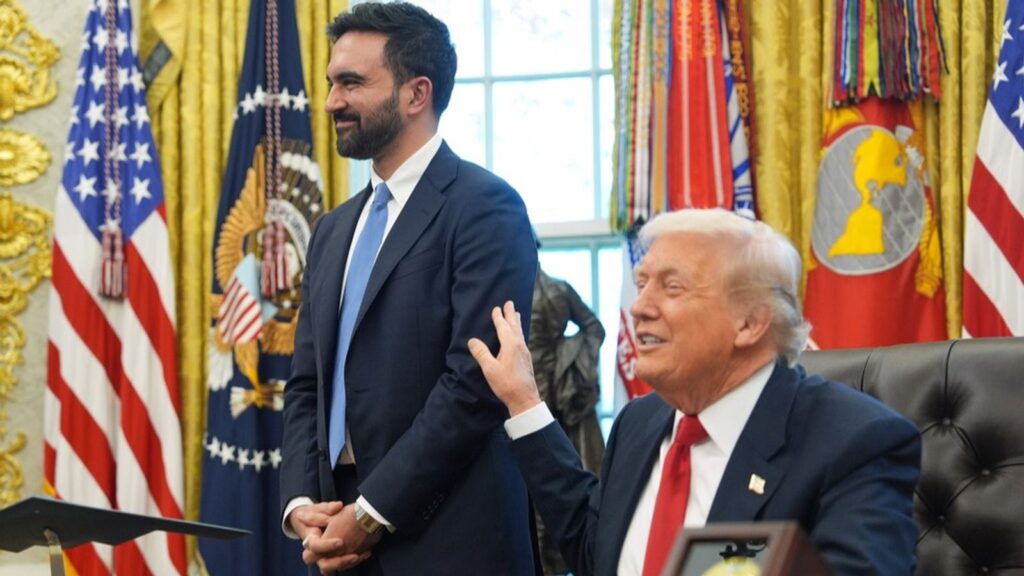
On Friday afternoon, New York City Mayor-elect Zohran Mamdani met with President Donald Trump at the White House, a meeting that culminated in a 30-minute press conference in the Oval Office. The event has sparked widespread controversy, as Mamdani, a member of the Democratic Socialists of America (DSA), announced a “partnership” with Trump, pledging to “work together” with the president.
The announcement comes as a shock to many, given Mamdani’s association with progressive politics and Trump’s polarizing presidency. During the press conference, Trump congratulated Mamdani on his electoral victory, expressing a desire to support Mamdani’s efforts in New York City. Mamdani reciprocated, describing the meeting as “productive” and centered around mutual admiration for New York City.
Focus on Affordability and Cost of Living
The two leaders emphasized their discussion on “affordability,” with Mamdani expressing his intent to collaborate with Trump to tackle the cost-of-living crisis in New York. “I am looking forward to delivering for New Yorkers in partnership with the president,” Mamdani stated, comparing their prospective partnership to the historic New Deal under Franklin D. Roosevelt.
This development follows a period of intense scrutiny of the Trump administration’s policies, which have been criticized for disproportionately affecting the working class. Trump’s administration has been noted for slashing social welfare programs and orchestrating significant wealth transfers to the wealthy elite.
Immigration and Law Enforcement Stances
During the press conference, Mamdani remained silent as Trump defended his administration’s aggressive immigration policies, which have included widespread raids and deportations. Trump claimed that Mamdani shared his desire for a “safe New York,” suggesting that Mamdani supported the removal of “horrible people.”
Mamdani’s silence on these issues, coupled with his past criticism of Immigration and Customs Enforcement (ICE) as a “rogue agency,” has raised questions about his stance on immigration enforcement. When pressed, Mamdani vaguely mentioned the need for cooperation between New York City and the federal government.
On law enforcement, Trump praised Mamdani for retaining Police Commissioner Jessica Tisch, known for her ties to the Trump family and her controversial policies. Mamdani pledged to maintain the police force’s size and focus on enhancing police work, aligning with Trump’s law-and-order approach.
International Policy and Political Reactions
Mamdani’s comments on international policy, particularly regarding the Israeli-Palestinian conflict, have also drawn criticism. He expressed support for efforts towards peace while endorsing Trump’s moves to facilitate Israeli occupation under a ceasefire framework. His remarks have been perceived as legitimizing Trump’s controversial foreign policy.
The meeting took place amid escalating political tensions within the Trump administration, including divisions over Trump’s alleged involvement in scandals and mounting opposition to his policies. In North Carolina, students have staged walkouts in defense of immigrant families, and nationwide protests against authoritarianism have gained momentum.
Implications for Mamdani and the DSA
The Mamdani-Trump meeting has significant implications for Mamdani’s political future and the Democratic Socialists of America. Critics argue that Mamdani’s alignment with Trump undermines the progressive values that propelled him into office. The DSA’s response, labeling the meeting as a victory for socialism, has been met with skepticism.
According to political analysts, Mamdani’s approach reflects a broader trend within the DSA and similar movements globally, where attempts to enact change within established political frameworks often lead to compromises. Historical parallels can be drawn with movements like Syriza in Greece and Podemos in Spain, which faced challenges in maintaining their radical agendas.
As the political landscape continues to evolve, the partnership between Mamdani and Trump raises questions about the future of progressive politics in the United States. For Mamdani, the challenge will be to navigate the complexities of governance while staying true to the ideals that garnered him support.
The unfolding events underscore the need for a critical examination of political alliances and the strategies employed by progressive movements in their quest for social change. As the debate continues, the focus will likely remain on how Mamdani balances his commitments to his constituents with the realities of political power.





